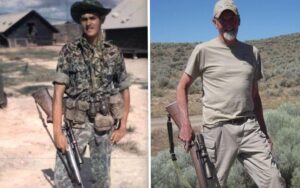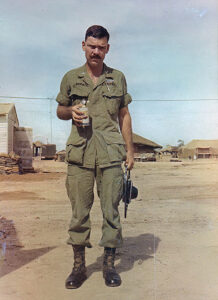A proud veteran who simply did his duty gives an account refreshingly free of cynicism and self-pity.
By Colonel Joseph T. Cox, U.S. Army
In 1964 James E. Parker, Jr., was a restless college student who quit school and enlisted in the Army. In 1965, he was an infantry lieutenant fresh out of Officer Candidate School, deploying to Vietnam with lead elements of the 1st Infantry Division, the fabled “Big Red One.”
Bloodied in combat, Parker left the Army after 31Ž2 years of honorable service, finished his education and married, then went to work for the CIA, leading Hmong troops against the Pathet Lao and their North Vietnamese allies. On April 30, 1975, Communist forces captured Saigon at the same time Parker, then a CIA officer in the Mekong Delta, was piloting a landing craft filled with refugees off the beach near Vung Tau. He was literally one of the very last Americans out of Vietnam. His straightforward account of the Vietnam War is a fascinating Far Eastern personal odyssey.
But Jim Parker is no shifty Odysseus or hubris-haunted Achilles. When he was growing up near Fort Bragg, N.C., his mentor was a paratrooper sergeant dubbed “Cottonpicker” who challenged him to “do what comes naturally.” Among the things that come naturally to Parker are his love of country, service to others and storytelling. Unlike many who write about America’s fall from grace in Vietnam, Parker never sees himself as a victim, nor does he lose faith in his country–even though he saw clearly and reports accurately how the war in Vietnam degenerated. Throughout his memoirs, Last Man Out (John Culler & Sons, Camden, S.C., 1997, $23.95), he remains the plain-spoken, modest American Everyman with a native Southerner’s knack for telling a story and a master raconteur’s ear for dialogue and eye for detail.
Every veteran of the postWorld War II army that first went to Vietnam will relish Parker’s account of his drill sergeant’s welcoming speech: “Oh, and one more thing. I do not like ya, any of ya, and I don’t want ya for a friend, any of ya. Don’t try to be nice to me. Stay away. Do not talk with me. Do not come close to me unless ya have to. I do not want to know ya first names, I do not want to know about ‘sa dog or ya Momma or dat ya girlfriend’s pregnant. Stay away from me. See the Chaplain if ya want to talk with someone nice. I am Drill Sergeant Willie O. McGee. Stay da f– away.”
And every veteran who has ever seen the human cost of war will appreciate Parker’s unflinching honesty and attention to the human details of the consequences of combat. “The Vietnamese prisoner had one arm blown off above the elbow. His right leg was cantilevered at a crazy angle, and his left leg was torn open at the thigh, with a jagged piece of bone sticking out. His olive-green uniform was matted with blood, dirt, and slime, and the jacket had several bullet holes in it. Half of his face had been blown away. Some of his teeth and lower jawbone were exposed. Most of his left cheekbone was missing, and his left eye was dangling by a few strands of muscle and tissue. But he was breathing deep heavy breaths. His good eye was moving and making eye contact with us as we looked down on him.”
Throughout Last Man Out, Parker unsentimentally chronicles his love for his country, his fellow soldiers and the Vietna-mese people. His account is also the story of a boy becoming a man in a system that would fail to measure up to today’s politically correct standards of consideration for others. Early in the war when Parker signed on, however, it was as close to a pure meritocracy as such a system could be, and it produced competent, caring patriots who, like Parker, did their best to support and defend constitutionally formulated foreign policy objectives. Last Man Out will make readers who served in Vietnam remember the particulars of their training leading up to deployment and those hundreds of forgotten incidents that made up a tour of duty. For those who know the Vietnam War as history, it will help tell the rest of the story. This is an account of a proud veteran who simply did his duty.
There comes a time when old soldiers owe it to posterity to offer a summing up, but it is unusual and refreshing when memoirs appear free of prevailing mythology or self-serving ambition. Parker thinks for himself and tells no “bright shining lies.” The results are thoroughly honest and compelling Vietnam memoirs about uncommon duty in Southeast Asia. Last Man Out is an unpretentious account of extraordinary service, a tale told with humility and humor and packed with history and heroism.
Refreshingly free of cynicism, self-pity and self-aggrandizement, Parker’s candid account of the human dimension of combat belongs on your bookshelf next to other soldierly accounts of honorable duty such as Harold Moore and Joseph Galloway’s We Were Soldiers Once and Young.




